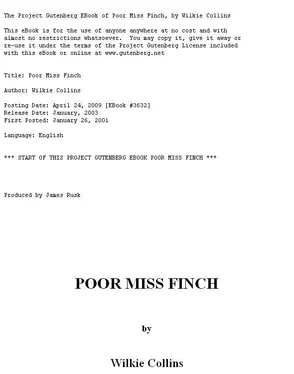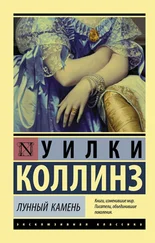Уилки Коллинз - Poor Miss Finch
Здесь есть возможность читать онлайн «Уилки Коллинз - Poor Miss Finch» весь текст электронной книги совершенно бесплатно (целиком полную версию без сокращений). В некоторых случаях можно слушать аудио, скачать через торрент в формате fb2 и присутствует краткое содержание. Год выпуска: 2002, Жанр: Классическая проза, на английском языке. Описание произведения, (предисловие) а так же отзывы посетителей доступны на портале библиотеки ЛибКат.
- Название:Poor Miss Finch
- Автор:
- Жанр:
- Год:2002
- ISBN:нет данных
- Рейтинг книги:3 / 5. Голосов: 1
-
Избранное:Добавить в избранное
- Отзывы:
-
Ваша оценка:
- 60
- 1
- 2
- 3
- 4
- 5
Poor Miss Finch: краткое содержание, описание и аннотация
Предлагаем к чтению аннотацию, описание, краткое содержание или предисловие (зависит от того, что написал сам автор книги «Poor Miss Finch»). Если вы не нашли необходимую информацию о книге — напишите в комментариях, мы постараемся отыскать её.
Poor Miss Finch — читать онлайн бесплатно полную книгу (весь текст) целиком
Ниже представлен текст книги, разбитый по страницам. Система сохранения места последней прочитанной страницы, позволяет с удобством читать онлайн бесплатно книгу «Poor Miss Finch», без необходимости каждый раз заново искать на чём Вы остановились. Поставьте закладку, и сможете в любой момент перейти на страницу, на которой закончили чтение.
Интервал:
Закладка:
On the seventeenth of the month, I had got my passport regulated, and had packed up the greater part of my baggage in anticipation of my journey back to England on the next day.
Carefully as I had tried to accustom his mind to the idea, my poor father remained so immovably reluctant to let me leave him, that I was obliged to consent to a sort of compromise. I promised, when the business which took me to England was settled, to return again to Marseilles, and to travel back with him to his home in Paris, as soon as he was fit to be moved. On this condition, I gained permission to go. Poor as I was, I infinitely preferred charging my slender purse with the expense of the double journey, to remaining any longer in ignorance of what was going on at Ramsgate—or at Dimchurch, as the case might be. Now that my mind was free from anxiety about my father, I don't know which tormented me most—my eagerness to set myself right with my sister-friend, or my vague dread of the mischief which Nugent might have done while my back was turned. Over, and over again I asked myself, whether Miss Batchford had, or had not, shown my letter to Lucilla. Over and over again, I wondered whether it had been my happy privilege to reveal Nugent under his true aspect, and to preserve Lucilla for Oscar after all.
Towards the afternoon, on the seventeenth, I went out alone to get a breath of fresh air, and a look at the shop-windows. I don't care who or what she may be—high or low; handsome or ugly; young or old—it always relieves a woman's mind to look at the shop-windows.
I had not been five minutes out, before I met my princely superintendent.
"Any news for me to-day?" I asked.
"Not yet."
"Not yet?" I repeated. "You expect news then?"
"We expect an Italian steam-ship to arrive in port before the evening," said the superintendent. "Who knows what may happen?"
He bowed and left me. I felt no great elation on contemplating the barren prospect which his last words had placed before me. So many steamers had arrived at Marseilles, without bringing any news of the missing man, that I attached very little importance to the arrival of the Italian ship. However, I had nothing to do—I wanted a walk—and I thought I might as well stroll down to the port, and see the vessel come in.
The vessel was just entering the harbor by the time I got to the landing-stage.
I found our man employed to investigate travelers arriving by sea, punctually at his post. His influence broke through the vexatious French rules and regulations which forbid all freedom of public movement within official limits, and procured me a place in the room at the custom-house through which the passengers by the steamer would be obliged to pass. I accepted his polite attention, simply because I was glad to sit down and rest in a quiet place after my walk—not even the shadow of an idea that anything would come of my visit to the harbor being in my mind at the time.
After a long interval the passengers began to stream into the room. Looking languidly enough at the first half-dozen strangers who came in, I felt myself touched on the shoulder from behind. There was our man, in a state of indescribable excitement, entreating me to compose myself!
Being perfectly composed already, I stared at him, and asked, "Why?"
"He is here!" cried the man. "Look!"
He pointed to the passengers still crowding into the room. I looked; and, instantly losing my head, started up with a cry that turned everybody's eyes on me. Yes! there was the poor dear discolored face—there was Oscar himself, thunderstruck on his side at the sight of Me!
I snatched the key of his portmanteau out of his hand, and gave it to our man—who undertook to submit it to the customhouse examination, and to bring it to my lodging afterwards. Holding Oscar fast by the arm, I pushed my way through the crowd in the room, got outside, and hailed a cab at the dock gates. The people about, noticing my agitation, said to each other compassionately, "It's the blue man's mother!" Idiots! They might have seen, I think, that I was only old enough to be his elder sister.
Once sheltered in the vehicle, I could draw my breath again, and reward him for all the anxiety he had caused me by giving him a kiss. I might have given him a thousand kisses. Amazement made him a perfectly passive creature in my hands. He only repeated faintly, over and over again, "What does it mean? what does it mean?"
"It means that you have friends, you wretch, who are fools enough to be too fond of you to give you up!" I said. "I am one of the fools. You will come to England with me to-morrow—and see for yourself if Lucilla is not another."
That reference to Lucilla restored him to the possession of his senses. He began to ask the questions that naturally occurred to him under the circumstances. Having plenty of questions in reserve, on my side, I told him briefly enough what had brought me to Marseilles, and what I had done, during my residence in that city, towards discovering the place of his retreat.
When he asked me next—after a momentary struggle with himself—what I could tell him of Nugent and Lucilla, it is not to be denied that I hesitated before I answered him. A moment's consideration, however, was enough to decide me on speaking out—for this plain reason, that a moment's consideration reminded me of the troubles and annoyances which had already befallen us as the result of concealing the truth. I told Oscar honestly all that I have related here—starting from my night interview with Nugent at Browndown, and ending with my precautionary measures for the protection of Lucilla while she was living under the care of her aunt.
I was greatly interested in watching the effect which these disclosures produced on Oscar.
My observation led me to form two conclusions. First conclusion, that time and absence had not produced the slightest change in the love which the poor fellow bore to Lucilla. Second conclusion, that nothing but absolute proof would induce him to agree in my unfavorable opinion of his brother's character. It was in vain I declared that Nugent had quitted England pledged to find him, and had left it to me (as the event now proved) to make the discovery. He owned readily that he had seen nothing, and heard nothing, of Nugent. Nevertheless his confidence in his brother remained unshaken. "Nugent is the soul of honor," he repeated again and again—with a side-look at me which suggested that my frankly-avowed opinion of his brother had hurt and offended him.
I had barely time to notice this, before we reached my lodgings. He appeared to be unwilling to follow me into the house.
"I suppose you have some proof to support what you have said of Nugent," he resumed, stopping in the courtyard. "Have you written to England since you have been here? and have you had a reply?"
"I have written to Mrs. Finch," I answered; "and I have not had a word in reply."
"Have you written to no one else?"
I explained to him the position in which I stood towards Miss Batchford, and the hesitation which I had felt about writing to Grosse. The smoldering resentment against me that had been in him ever since I had spoken of his brother and of Lucilla, flamed up at last.
"I entirely disagree with you," he broke out angrily. "You are wronging Lucilla and wronging Nugent. Lucilla is incapable of saying anything against you to Grosse; and Nugent is equally incapable of misleading her as you suppose. What horrible ingratitude you attribute to one of them—and what horrible baseness to the other! I have listened to you as patiently as I can; and I feel sincerely obliged by the interest which you have shown in me—but I cannot remain in your company any longer. Madame Pratolungo, your suspicions are inhuman! You have not brought forward a shadow of proof in support of them. I will send here for my luggage, if you will allow me—and I will start for England by the next train. After what you have said, I can't rest till I have found out the truth for myself."
Читать дальшеИнтервал:
Закладка:
Похожие книги на «Poor Miss Finch»
Представляем Вашему вниманию похожие книги на «Poor Miss Finch» списком для выбора. Мы отобрали схожую по названию и смыслу литературу в надежде предоставить читателям больше вариантов отыскать новые, интересные, ещё непрочитанные произведения.
Обсуждение, отзывы о книге «Poor Miss Finch» и просто собственные мнения читателей. Оставьте ваши комментарии, напишите, что Вы думаете о произведении, его смысле или главных героях. Укажите что конкретно понравилось, а что нет, и почему Вы так считаете.






